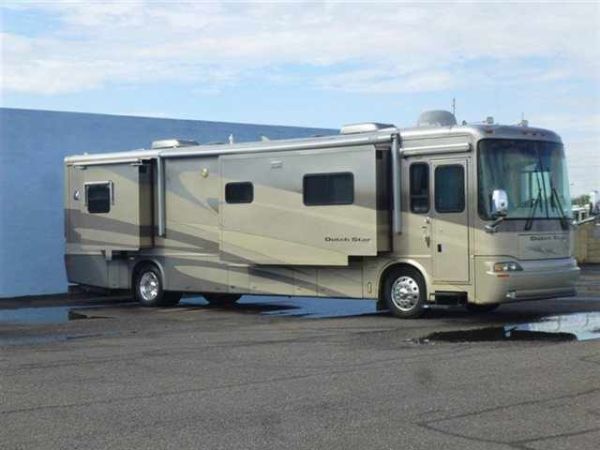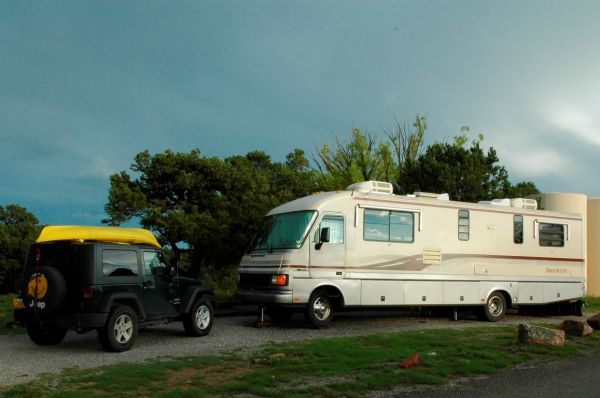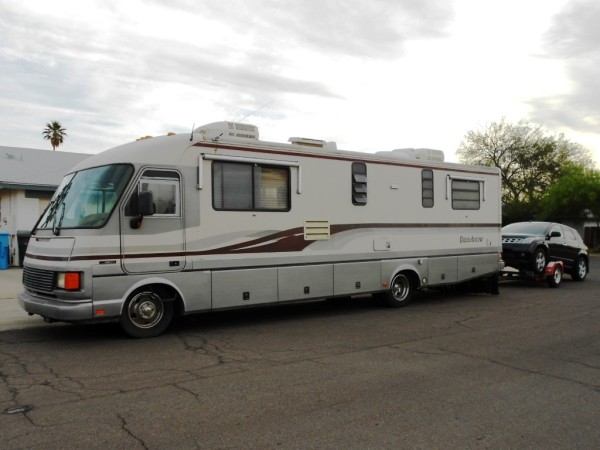I am frequently asked questions about buying a used RV. I’m not sure exactly why – I suppose because I did it twice and have been happy with both purchases. However; that doesn’t make me an expert – I am sure there is a LOT that I don’t know. In fact, I learn new things about my motorhome constantly. So, take what I offer with that caveat. I hope someone finds something here that is helpful to them.
In most cases, the buyer is new to the world of motorhomes and really doesn’t have a clue what to look for, what is important and what is not, or even how to proceed. So, I’ll document what I can think of and hope that it helps someone!
My first suggestion is to be realistic with your finances, skills, and goals.
Finances:
Pretty obvious. If you don’t have the money, don’t get in over your head for a luxury item like an RV. Doing so is simply poor money management – just don’t do it. There is much debate about financing or paying cash. I don’t like debt so you can guess where I stand. However; the interest for an RV loan is deductible on your taxes if you do not already have a second mortgage (see a tax pro). So, it does make a bit of sense (in my fantasy world at least) for a full timer to finance for the tax benefits.
Skills:
RV’s are simply a house on wheels. Yes, maybe a small house – maybe a big house. A motorhome is much more complicated in that it is a house on a very big truck. An RV never requires less upkeep and maintenance than your sticks and bricks house (S&B). In fact, they usually require much more. Throw a big truck in the mix and you can imagine the skills – electrician, plumber, carpenter, roofer, mechanic, etc… as well as the required time. Obviously, you can hire the maintenance/repair/upgrade work out – just like your S&B. However; that costs money – sometimes a lot of it. I am a DIY kind of guy and I enjoy working on my RV – both repairs and upgrades/enhancements. The downsides of this is that many of the chassis parts on a motorhome are very big and heavy which makes them very difficult to work on without the appropriate tools. I’ve met many RV’ers that know nothing about their rig and have no interest – they hire all the work out. That’s fine – just be realistic with your budget. Either plan plenty of time to do the necessary and recurring maintenance yourself or include money in the budget to hire it out.
Goals:
The range is huge. Some people use their RV for two weekends a year to get away from home and go to the lake. Some people use it every weekend. Some people live in it. Some people travel thousands of miles every year in it. Some people go to huge RV rallys to visit other RV’ers. Some travel as far from humans as possible and camp in solitude for weeks at a time. Some have never spent a night outside an RV park/campground, others have never been in one. Be realistic and figure out how you want to use your RV. A diesel pusher to go twenty miles to the lake once or twice a year is silly. Living in a small Class B is pretty tough (though doable). Are you going to spend one, maybe two nights at a time in it or weeks at a time? Are you going to always have a spot in a campground with power and water or are you going to dry camp in the forest? All of these factors help to point you to a particular type of RV. If staying in campgrounds, the size of the water tanks doesn’t matter too much. It does matter if you plan to dry camp for three weeks at a time. If dry camping in remote areas, a big diesel pusher coach may not be the easiest rig to get up those logging trails. A pickup camper may look silly to some but wait til you see it on the back of a four-wheel drive truck, far from civilization, on the top of mountain overlooking the most spectacular scenery imaginable. Suddenly, they make great sense. Think realistically about how you plan to use your RV and buy accordingly.
Ok, you have a budget and have figured out what type of rig suits your needs/goals. The next step is to decide on your approach – prioritize the issues. Some folks will not look at an RV if it doesn’t have a single handle kitchen sink or spice rack in the kitchen (exaggeration). That’s fine but in a big dollar purchase, those are pretty minor things and easily changed after purchase. It is generally better to prioritize the high dollar items. Chassis condition, engine condition, tire condition, battery bank condition, charging system, etc… A replacement set of six tires for a Class A motorhome can easily set you back $3,000 or more – that’s pretty significant compared to the cost of a new kitchen faucet. So, the following is a list of relatively major items to check, in no particular order. You’ll need to bring some work clothes, maybe something to lay on while your crawl under the rig, mirror, flashlight, pen and paper, and a few basic tools to access things.
- Engine – You should probably have an experienced mechanic check this out. Do some online research, some powerplants have common problems. Knowing about these problems may help you avoid an expensive mistake or maybe just help to negotiate a lower price.
- Transmission – You should probably have an experienced mechanic check this out. Other than research, I really do not know how to check this beyond driving it and listening/feeling for sounds/problems.
- Tires – Get the code off EACH of the tires (six) and see how old each and every one of them is. A little trick occasionally used is to put really old tires on the inside of the duals as so few people will crawl under to get the date code. Seven years is the rule-of-thumb limit. Older than that and they need replaced. Also check for unusual wear, excessive wear, cracking, and so forth.
- Brakes – Good breaks are necessary to slow down these 20,000 pounds behemoths, obviously. A pulsing feeling when applying them indicates that the rotors may be warped. This is common on motorhomes because people ride the brakes and overheat them – particularly when going downhill. This isn’t usually particularly expensive repair but could be if it goes beyond just the rotors.
- Batteries – Most RV’s have two sets of batteries. One or more in a bank for the engine. Typically two or more in a bank for the house. The ideal house battery bank uses multiple six-volt batteries wired together to provide a 12 volt system. The total storage capacity of the system depends on the batteries and how they are connected. If you plan lots of dry camping, a 400-600 amp hour capacity is a wonderful thing and typically requires six 6 volt batteries. Of course, there are a huge number of variables and possibilities. The important point is to ensure that the batteries are good. The only good way to do this requires disconnecting all of them and measuring each individually. Most sellers will not allow that. So, at least checking the bank voltage after it has been sitting at rest (not charging nor supplying power to anything) for a few hours. It should be up around 12.6 volts. Batteries should be replaced as a set so one bad battery in a bank of six can cost you $1,000.00 (depending on type of battery).
- Battery Monitor – This is not mandatory but without it you will never know the actual state of your battery bank. I have the Trimetric unit which is excellent.
- Roof – This can be really hard to check. At a minimum, climb the ladder, get on top, and give it a good look. There should be no tears or obvious problems. A well maintained roof has lots of sealant around all the openings/seams. Sometimes this looks bad but one should maintain the roof at least once a year by adding more sealant as the old ages, cracks, or fails and this builds up and sometimes looks not great. Check for soft spots. These usually indicate a leak and water soaked wood. This CAN be a MAJOR problem. Certainly fixable but not easy or cheap. Look under the soft spot on the interior to see if there are signs of water.
- Charging System – A modern charger/converter is at least a three-stage unit that provides the appropriate voltage depending on the battery state of charge. Old chargers just pump the same amount of voltage no matter what. This will cook the batteries destroying them in fairly short order. If you plan to be connected to shore power a lot, this is an important item. The good news is that a good charger/converter only costs a few hundred dollars but installation is sometimes a bit of work.
- Inverter – This device supplies 120 V “house” current to your RV when only battery power is available. Even a big battery bank (capacity) can only provide so much 120 V power (pretty limited). Many rigs have one big inverter 2000-4000 watt that powers all the outlets in the house. Others have one or more smaller inverters (200-400 watts) that provide local power (to specific appliances, or a couple of outlets).
- Exterior condition – Ripples in the exterior skin are a bad thing and usually indicate delamination and large problems. Oxidation and/or dull paint isn’t necessarily bad. The rig may just need a very good clean and polish. I did this to mine and it came out looking great.
- Air Conditioning Units – Typically RV AC units are sealed and not serviceable (to a point). When they stop producing cold air, most people replace with a new unit. I’ve heard it said that ten years is the most to expect but both my units are twenty years old and working well. I suppose it is hit or miss but at least run both of them and confirm they are working. A replacement unit is in the $700-$1,500 range plus installation. Of course, you camping style may mean you never turn them on so possibly this is not a show stopper.
- Work the toilet, holding tanks, and dump system (before purchase). Sometimes a gate valve is bad or the toilet won’t hold water (it should). In most cases, rebuilding a toilet is not difficult or expensive.
- Doors, hinges, latches – Open and close every door on the rig (inside and outside). Make sure they all work and fit correctly. Poor fit and/or finicky operation may indicate a larger problem.
A problem with any of these things does not stop the deal but it should be factored into the cost.
Many advise buyers to test everything. I think that is good advice. Sometimes it is easier said than done. Nonetheless; I encourage you to make every effort.
Depending on the weather conditions under which you want to camp, you might consider a few more items
- Dual pane windows – Windows are big leaks in the cold winter months. The better windows are worth it when it is 20 degrees outside. The old crank open mobile home type windows were popular in older RV’s. They are pretty miserable in cold weather.
- Insulation quality – Nearly impossible to check but at least having a rig that the manufacturer has claimed to have insulated during construction is a start. I don’t think mine has much, if any, insulation in most places.
- Insulated holding tanks
Some real positives to consider.
- Solar charging system – I’m not talking about the little two foot square panel that came on many RV’s to add solar to the marketing brochure but rather a significant installation – 400 watts or more.
Finally, other people’s opinions…. You know the saying, everyone has one. The forum’s are thick with them. An opinion is fine, when it is presented as an opinion. Too often they are presented as facts. Some of the common ones follow, think about them for a minute and you will see the ridiculousness in them.
- Never buy a motorhome without maintenance records.
- Never buy a motorhome that has been lived in (full-timer).
- Never buy a motorhome that has had pets.
- Never buy a motorhome that has been worked on by X (pick your poison – Camping World, Walmart, Joe’s Transmission and Pet Supply, whatever….).
In my opinion, there are some excellent used RV’s available but sorting thru all the options to find them is not always easy. However; this RV thing is a hobby so dive in and enjoy the ride!




Good tips! These will definitely come in handy when buying an RV. Make sure to double check the batteries and ask about maintenance. Proper maintenance can extend their lifespan and keeps them in a good condition.
Thanks so much for your comments. My husband and I are just beginning our search for an RV. We are just retired, earlier than planned due to a health issue , which is resolved now but caused my husband to retire . We are definitely thinking of buying a used class A because we’d like to do some travelling for awhile. You gave so many great tips on what to look for in a used RV, Thank you so much for taking the time to share your knowledge. We appreciate it.
Your welcome Sandy. It is nice to hear that someone found it useful – thank you! Best of luck in your search. Sometimes it takes a while but it is usually worth the wait. 🙂
Great info on window motor. I have a 1994 Pace Arrow window goes down. Heading to parts store now. Thanks Bill
That is great to hear Bill – thanks! Very glad it helped you out.